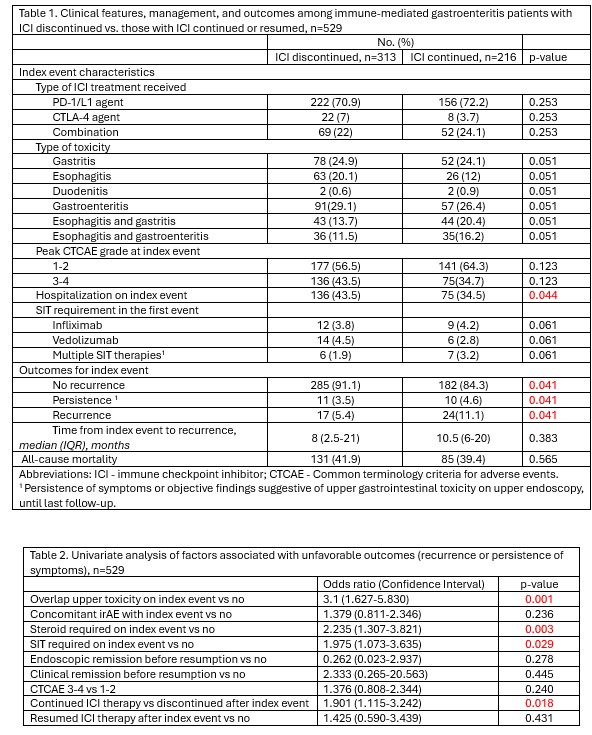Sunday Poster Session
Category: Stomach and Spleen
P2050 - Upper Gastrointestinal Immune-Mediated Toxicity: ICI Management Strategy and Factors Associated With Unfavorable Outcomes
Sunday, October 26, 2025
3:30 PM - 7:00 PM PDT
Location: Exhibit Hall

Maria Julia M. N Santos, MD (she/her/hers)
MD Anderson Cancer Center
Houston, TX
Presenting Author(s)
Maria Julia M. N.. Santos, MD1, Carolina Cruz, MD2, Anirudha Chatterjee, MD3, Reema Patel, MD3, Sharada Wali, MBBS, MPH2, Hari Movva, MD3, Andrew Lee, BS2, Mehnaz Shafi, MD1, Anusha Shirwaikar Thomas, MD2, Krishnavathana Varatharajalu, MD1, Yinghong Wang, MD, PhD, MS2
1MD Anderson Cancer Center, Houston, TX; 2University of Texas MD Anderson Cancer Center, Houston, TX; 3University of Texas Medical Branch, Galveston, TX
Introduction: The widespread use of immune checkpoint inhibitors (ICIs) as cancer therapy has led to an increase in upper gastrointestinal (GI) adverse events, notably gastritis, enteritis, esophagitis, and overlapping presentations. Balancing the efficacy of the ICI and the management of its toxicities is a major challenge for health care providers, who must determine whether to continue ICIs, adjust dosage, or discontinue the treatment. Furthermore, the identification of early predictors of unfavorable outcomes, notably recurrence or persistence of disease, is critical to guide risk stratification, personalize follow-up, and management.
Methods: We retrospectively analyzed 529 patients with upper GI irAEs. Patients were grouped based on ICI status after the index toxicity event: ICI continued or resumed after the episode and ICI discontinued. Clinical outcomes included remission and unfavorable outcomes (recurrence or persistence of symptoms).Groups were compared using chi-square tests and logistic regression.
Results: Of 529 patients, 216 (40.8%) continued or resumed ICI therapy and 313 (59.2%) had ICI discontinued after the index event. Recurrence occurred more frequently in the continued group (11.1% vs. 5.4%, p=0.041), while persistence of toxicity findings until last follow-up was comparable (4.6% vs. 3.5%). There was a trend of ICI discontinuation among patients in an inpatient setting, suggesting that continuation or resumption of ICI may have been selected for outpatient cases. Factors associated with increased risk of unfavorable outcomes included overlapping symptom presentation (OR 3.1, 95% CI 1.63-5.83), acute inflammation on histology (OR 1.82, 95% CI 1.03-3.21), steroid use (OR 2.24, 95% CI 1.31-3.82), selective immunotherapy (SIT) use (OR 1.98, 95% CI 1.07-3.64), and ICI being continued after the index event (OR 1.90, 95% CI 1.12-3.24). These factors remained significant in univariate analysis and can inform future risk stratification models.
Discussion: Post-toxicity ICI continuation after upper GI irAEs was associated with a higher rate of recurrence compared to ICI being discontinued. Patients with overlapping upper GI phenotypes, acute inflammation on histology, or those who required steroids or SIT in the first event are at higher risk for recurrence or symptom persistence. In addition to early identification of high-risk patients, clinical decision-making should balance oncologic benefits with toxicity severity to individualize care.

Figure: Chi-square and univariate analysis of factors associated with unfavorable outcomes.

Figure: Outcomes and factors associated with persistent or recurrent upper gastrointestinal immune-mediated toxicity.
Disclosures:
Maria Julia Santos indicated no relevant financial relationships.
Carolina Cruz indicated no relevant financial relationships.
Anirudha Chatterjee indicated no relevant financial relationships.
Reema Patel indicated no relevant financial relationships.
Sharada Wali indicated no relevant financial relationships.
Hari Movva indicated no relevant financial relationships.
Andrew Lee indicated no relevant financial relationships.
Mehnaz Shafi indicated no relevant financial relationships.
Anusha Shirwaikar Thomas indicated no relevant financial relationships.
Krishnavathana Varatharajalu indicated no relevant financial relationships.
Yinghong Wang indicated no relevant financial relationships.
Maria Julia M. N.. Santos, MD1, Carolina Cruz, MD2, Anirudha Chatterjee, MD3, Reema Patel, MD3, Sharada Wali, MBBS, MPH2, Hari Movva, MD3, Andrew Lee, BS2, Mehnaz Shafi, MD1, Anusha Shirwaikar Thomas, MD2, Krishnavathana Varatharajalu, MD1, Yinghong Wang, MD, PhD, MS2. P2050 - Upper Gastrointestinal Immune-Mediated Toxicity: ICI Management Strategy and Factors Associated With Unfavorable Outcomes, ACG 2025 Annual Scientific Meeting Abstracts. Phoenix, AZ: American College of Gastroenterology.
1MD Anderson Cancer Center, Houston, TX; 2University of Texas MD Anderson Cancer Center, Houston, TX; 3University of Texas Medical Branch, Galveston, TX
Introduction: The widespread use of immune checkpoint inhibitors (ICIs) as cancer therapy has led to an increase in upper gastrointestinal (GI) adverse events, notably gastritis, enteritis, esophagitis, and overlapping presentations. Balancing the efficacy of the ICI and the management of its toxicities is a major challenge for health care providers, who must determine whether to continue ICIs, adjust dosage, or discontinue the treatment. Furthermore, the identification of early predictors of unfavorable outcomes, notably recurrence or persistence of disease, is critical to guide risk stratification, personalize follow-up, and management.
Methods: We retrospectively analyzed 529 patients with upper GI irAEs. Patients were grouped based on ICI status after the index toxicity event: ICI continued or resumed after the episode and ICI discontinued. Clinical outcomes included remission and unfavorable outcomes (recurrence or persistence of symptoms).Groups were compared using chi-square tests and logistic regression.
Results: Of 529 patients, 216 (40.8%) continued or resumed ICI therapy and 313 (59.2%) had ICI discontinued after the index event. Recurrence occurred more frequently in the continued group (11.1% vs. 5.4%, p=0.041), while persistence of toxicity findings until last follow-up was comparable (4.6% vs. 3.5%). There was a trend of ICI discontinuation among patients in an inpatient setting, suggesting that continuation or resumption of ICI may have been selected for outpatient cases. Factors associated with increased risk of unfavorable outcomes included overlapping symptom presentation (OR 3.1, 95% CI 1.63-5.83), acute inflammation on histology (OR 1.82, 95% CI 1.03-3.21), steroid use (OR 2.24, 95% CI 1.31-3.82), selective immunotherapy (SIT) use (OR 1.98, 95% CI 1.07-3.64), and ICI being continued after the index event (OR 1.90, 95% CI 1.12-3.24). These factors remained significant in univariate analysis and can inform future risk stratification models.
Discussion: Post-toxicity ICI continuation after upper GI irAEs was associated with a higher rate of recurrence compared to ICI being discontinued. Patients with overlapping upper GI phenotypes, acute inflammation on histology, or those who required steroids or SIT in the first event are at higher risk for recurrence or symptom persistence. In addition to early identification of high-risk patients, clinical decision-making should balance oncologic benefits with toxicity severity to individualize care.

Figure: Chi-square and univariate analysis of factors associated with unfavorable outcomes.

Figure: Outcomes and factors associated with persistent or recurrent upper gastrointestinal immune-mediated toxicity.
Disclosures:
Maria Julia Santos indicated no relevant financial relationships.
Carolina Cruz indicated no relevant financial relationships.
Anirudha Chatterjee indicated no relevant financial relationships.
Reema Patel indicated no relevant financial relationships.
Sharada Wali indicated no relevant financial relationships.
Hari Movva indicated no relevant financial relationships.
Andrew Lee indicated no relevant financial relationships.
Mehnaz Shafi indicated no relevant financial relationships.
Anusha Shirwaikar Thomas indicated no relevant financial relationships.
Krishnavathana Varatharajalu indicated no relevant financial relationships.
Yinghong Wang indicated no relevant financial relationships.
Maria Julia M. N.. Santos, MD1, Carolina Cruz, MD2, Anirudha Chatterjee, MD3, Reema Patel, MD3, Sharada Wali, MBBS, MPH2, Hari Movva, MD3, Andrew Lee, BS2, Mehnaz Shafi, MD1, Anusha Shirwaikar Thomas, MD2, Krishnavathana Varatharajalu, MD1, Yinghong Wang, MD, PhD, MS2. P2050 - Upper Gastrointestinal Immune-Mediated Toxicity: ICI Management Strategy and Factors Associated With Unfavorable Outcomes, ACG 2025 Annual Scientific Meeting Abstracts. Phoenix, AZ: American College of Gastroenterology.
